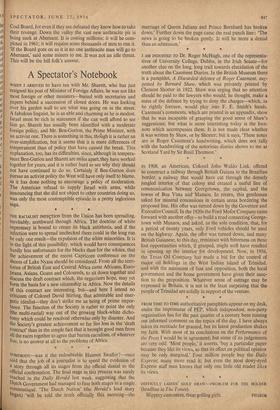IN 1908, an American, Colonel John Waldo Link, offered to
construct a railway through British Guiana to the Brazilian border, a railway that would have cut through the densely jungled interior of that colony and created a useful line of communication between Georgetown, the capital, and the towns of Boa Vista and Manaos. In return, this gentleman asked for mineral concessions in certain areas bordering the proposed line. His offer was turned down by the Governor and Executive Council. In the 1920s the Ford Motor Company came forward with another offer—to build a road connecting George- town with Manaos, and itsked, as the sole condition, that, for a period of twenty years, only Ford vehicles should be used on the highway. Again, the offer was turned down, and many British Guianese, to this day, reminisce with bitterness on these lost opportunities which, if grasped, might well have resulted in opening up the interior for development. Now, in 1956, the Texas Oil Company has made a bid for the control of major oil holdings in the West Indian island of Trinidad, and .with the minimum of fuss and opposition, both the local government and the home government have given their sanc- tion to the proposition. Whatever sense of outrage may be expressed in Britain, it is not in the least surprising that the people of Trinidad are solidly in support of the venture.


































 Previous page
Previous page